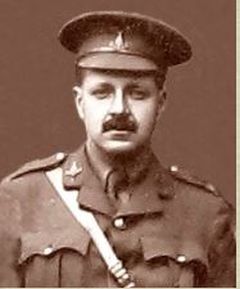
Erasmus Darwin was born on the 7th December 1881 in Cambridge and lived at ‘The Orchard’. He was the only son of Horace Darwin FRS (Fellow of the Royal Society) who was Chairman of the Cambridge Scientific Society. He was also the grandson of the famous naturalist Charles Darwin.
Erasmus was educated at Horris Hill School near Newbury and at Marlborough. He then went on to Trinity College, Cambridge University to study Mathematics. On leaving Cambridge he worked at Mather and Platts in Manchester, a hydraulics and pump engineering company. He then moved on to work for Bolckow, Vaughn & Co Ltd Iron and Steel in Middlesbrough, whereby, at the outbreak of the war he was Secretary of the Company. He lived at the time at Saltburn on the north east Yorkshire coast.
As soon as war broke out he joined up and was gazetted on the 12th September 1914 as a 2nd Lieutenant the 4th Battalion Yorkshire Regiment. Apparently just before he left England he was summoned to the War Office and offered a Staff appointment at home in connection to munitions work. Though the work was important he opted to stay with his unit making the case that there were plenty of older men equally qualified for the work.
The 4th Battalion arrived in France on the 18th April 1915 and were straight away into the 2nd Ypres offensive which started on the 22nd April. The Battalion was involved in the Battle of St Julien in the heart of the Ypres Salient. During an attack at a location called Fortuin on the 24th Erasmus was killed. His commanding office, Colonel Bell, said of him: ‘Loyalty, courage and devotion to duty, he had them all. He died in an attack that gained many compliments to the Battalion. He was right at the front. It was a man’s death’.
Erasmus has no known grave and is commemorated on the Menin Gate. He was 33 years of age.
Explore more memories from the ribbon
-
2nd Lieutenant Thomas Charles Goode M.B.E.
Researched by John Mills. Born 27th of January 1880 Thomas was the son of Sergeant Valentine Goode also of the Yorkshire Regiment and his mother was called Helen. He was part of a large family; he had five brothers and two sisters. He enlisted in Richmond on the 27th of August 1897. Being a first rate rifle shot he devoted himself to musketry and became an instructor. He served throughout the whole of the Boer War with the 1st Battalion. He was awarded the Queen’s medal with 6 clasps and the King’s with 2. In 1905 he married Mary Agnes Grace Dobinson. In 1914 he was with the 1st Battalion in India, his campaign medals indicate he was in France some time after 1915. He became a 2nd lieutenant in the Somerset Light Infantry (Prince Albert’s). He survived the war and retired with the rank of Captain on the 8th of June 1920. He was awarded the M.B.E. on the 3rd of June 1919 for his services in connection with the war in India. He must have returned to the army to serve in World War 2 because he has campaign medals (World War 2 service medal and war medal). Perhaps this might have been in some form of instructor role.
-
Sidonie van Eepoel
Sidonie van Eepoel died just a few months before the end of the First World War at the age of 40. Her family story is shared with a quarter of a million other Belgians, who fled to England to escape the invading German Army in 1914. Around 10,500 of these refugees ended up in Yorkshire, the biggest intake of any area outside London. For those who stepped off the train after up to a month of travelling there was both relief and exhaustion. It was after mid-September 1914 that were the first Belgian migrants started to arrive in Yorkshire. Sidonie’s family arrived in Richmond in November 1914, establishing their home at 10 Frenchgate. A total of 17 Belgians appear to have been made welcome in Richmond, with some also living at 10 Park Wynd. While Sidonie and her mother died during the war and were buried in Richmond in the town cemetery on Reeth Road, 15 of their friends and family returned to their native land when hostilities ceased. They were fit, safe and well thanks to the generosity and hospitality of the people of Richmond in their time of need. Photo submitted by Sara Cox.
-
Ernest Farrar
Judith Farrar told us the story of Ernest Holdsworth Farrar, the Great Uncle of her husband, Don. Ernest Farrar was born in 1882 in Leeds, after a spell at Teacher Training College in Isleworth, Middlesex he went on to study at Trinity College, Cambridge. He attained both a BA and BSc. After his graduation, Ernest spent some time in Dresden in Germany, and while the reasons for this sojourn are no longer known, it is highly likely that he continued as an academic at the University of Dresden. On his return to England Ernest was appointed to the Headship at Todmorden Secondary School. This important work continued after the outbreak of the First World War, but with the introduction of conscription in January 1916, Ernest was compelled to face several Tribunals when it was insisted that he enlist. The School Governors tried to intervene and to keep him as Headmaster, but he was sentenced to 6 months in Wormwood Scrubs prison. After an unsuccessful appeal, Ernest was sentenced by the Central London Tribunal to 6 months in Dartmoor Prison in 1917. His reasons for refusing to fight are given in the extract from the Yorkshire Post.
